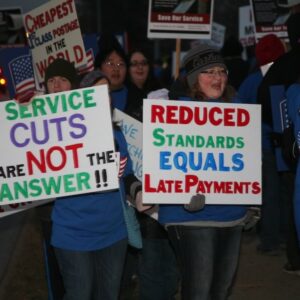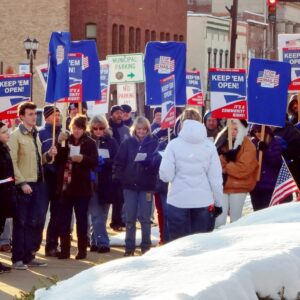September 22, 2014
APWU Wins Major Victory on Staffing in ‘POStPlan’ Offices
The APWU has won a major victory on staffing in post offices affected by the “POStPlan” – a victory that will result in the creation of at least 9,000 new Clerk Craft jobs within 90 days.
In a ruling dated Sept. 5, Arbitrator Stephen B. Goldberg concluded that jobs in four- and six-hour post offices must be assigned to clerks – not Part-Time Postmasters or Postmaster Reliefs (PMRs). A Sept. 22 Memorandum of Understanding (MOU) outlines procedures for implementing the award.
The ruling and MOU establish a minimum of 3,000 new Level 6 career jobs in six-hour offices and Level 18 offices. Positions in the six-hour offices must be staffed with full-time employees. The ruling and MOU establish more than 6,000 new Level 6 non-career jobs in four-hour offices, to be filled by Postal Support Employees (PSEs). The union expects thousands of additional new career jobs to be created as the process unfolds.
The Dispute: Where Are Our Jobs?
The dispute arose in 2012, when the USPS unveiled the POStPlan, which reduced the hours at thousands of post offices to 2, 4 or 6 hours. It also eliminated the supervisory duties of postmasters in the affected offices.
When implementing the plan, management replaced postmasters with Part-Time Postmasters and Postmaster Reliefs – not clerks.
The APWU filed a grievance challenging the assignment of Part-Time Postmasters and PMRs to the offices because the union believed it violated the requirement, outlined in the Collective Bargaining Agreement, to assign newly created or revised retail positions that had no supervisory duties to Clerk Craft employees. Several days of arbitration hearings were held in 2013, and union officials felt the case went well.
Serious Concerns
“But I had serious concerns that leaving the process solely to arbitration would lead to years of additional conflict with the Postal Service,” said APWU President Mark Dimondstein, “with disagreements over the meaning and implementation of the arbitrator’s ruling leading to additional rounds of arbitration. To break the cycle of unending disputes, we entered into serious settlement talks with management in January 2014 and continued to work for a negotiated settlement.
“Although significant progress was made in our informal negotiations, in the end we returned to Arbitrator Goldberg to rule on several outstanding issues. His ruling and the MOU mean thousands of jobs within 90 days – not years from now,” he said.
Dimondstein praised his union predecessors for laying the groundwork for the positive outcome. “The previous administration filed a solid grievance and presented a strong case in arbitration, which allowed us to engage in productive negotiations with management,” he said. “I appreciate the work of all those who participated, including National Business Agents, local union officers and APWU members who strategized on the case and testified.”
The Outcome
In his ruling, Goldberg denied the APWU’s claim only in offices open just two hours per day, where postmasters never had supervisory duties. In all other POStPlan offices he awarded the jobs to clerks, assigning full-time employees to six-hour offices and PSEs to four-hour offices.
Arbitrator Goldberg also ruled on a dispute over management’s use of PSEs in Level 18 post offices, directing the USPS to fill positions in those offices with career employees. Noting the Postal Service’s need for cost-savings, he relaxed some of the limits on the use of PSEs in POStPlan offices. He ruled that there is no prohibition on PSEs in four-hour offices working the window.
He also upheld language in the contract that prohibits supervisors in Level 18 offices from performing more than 15 hours of clerk work per week. The USPS had asserted that it wasn’t bound by the 15-hour limit in about 4,800 offices that were upgraded to Level 18.
The arbitrator remanded certain issues to the union and management to settle. These matters and several other issues were resolved in the Sept. 22, 2014, MOU.
“This is historic,” said Bob Johnson, the president of the Greater CT Area Local who assisted in the arbitration and the recent negotiations. “We haven’t had APWU members in most of these offices in decades, and now to have to have full-time positions in six-hour offices – that’s phenomenal!



